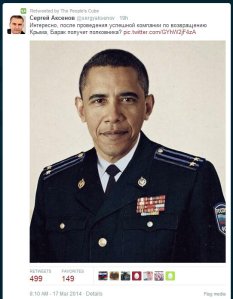Mr. Putin seems increasingly likely to get away with the effective annexation of Crimea, and many rightfully wonder what next? The rest of the Ukraine? The Baltic states? The U.S. has little appetite for military response, but can we more effectively counter the Russian bear? And should we?
The first question is what should we do? If not military action, then what kind of response would be effective? What is likely NOT effective is the petty sanctions that were regarded by friends and allies as weak, and openly mocked by the one’s targeted. One target wanted to thank Mr. Obama so much he made him a Colonel in the Russian army in a tweet. It is not encouraging to see our President openly mocked by thugs.
So does economics have anything to say? One of the more interesting areas of study in economics is that of Game Theory, which looks at how one should behave given the reaction of others. Robert Axlerod wrote his classic work The Evolution of Cooperation to show how repeated prisoner’s dilemmas could be solved to lead to cooperation. In his work, no strategy could beat “tit for tat,” i.e., reciprocal action. In a repeat game, which is what we see in the real world (this isn’t the last time we’ll be dealing with the Russians), if someone kicks you in the shins the dominant strategy is to respond in kind. This will eventually lead to cooperation, as its in the interest of both parties not to regularly get kicked in the shins.
This doesn’t necessarily mean that our response needs to be invading somewhere that Russia cares about, but it does mean that it needs to be proportional. Our current response is woefully short of that standard, which will only encourage Mr. Putin’s aggression. Yet is also critically important not to overreact; while Russia may be aggressive, she is not nearly so strong as she thinks she is. As Bismark and Churchill are both reported to have said (in some variants), “Russia is never as weak or as strong as she appears.” The WSJ had a feature of Putin’s economy over the weekend that noted how his Cronyism is shrinking the economy:
Russia’s economic growth rate has plummeted from the 7% average annual pace of the last decade to 1.3% last year. Now the brokerage arm of the country’s largest state bank, Sberbank, expects zero growth in 2014.
As Mr. Putin has consolidated power, he has also consolidated the economy, putting more centralized control back in. This leaves him highly dependent on oil revenues, which at high levels still leaves him in a no-growth economy. What happens if oil revenues fall? Does that suggest a U.S. response? What could we do to lower the price of oil? They aren’t calling us “Saudi America” for nothing…
Further, Russia is not a long term problem, although their nuclear weapons are. They are demographically dying, as this Foreign Affairs article suggests:
Over the past two decades, Russia has been caught in the grip of a devastating and highly anomalous peacetime population crisis. The country’s population has been shrinking, its mortality levels are nothing short of catastrophic, and its human resources appear to be dangerously eroding.
The biblical mandate to fill the earth is mocked at, yet God’s wisdom is that,
In a multitude of people is a king’s glory,
But in the dearth of people is a prince’s ruin.
We should not be too confident in this area ourselves, given our less than replacement value of procreation, but we’re in much better shape than Russia. Russia has big problems that will likely constrain her over the longer term. But in the near term, we need a reciprocal (proportional) response. Or it could get ugly in Europe.

 Bert Wheeler
Bert Wheeler
 Jeff Haymond
Jeff Haymond
 Marc Clauson
Marc Clauson
 Mark Caleb Smith
Mark Caleb Smith
 Tom Mach
Tom Mach